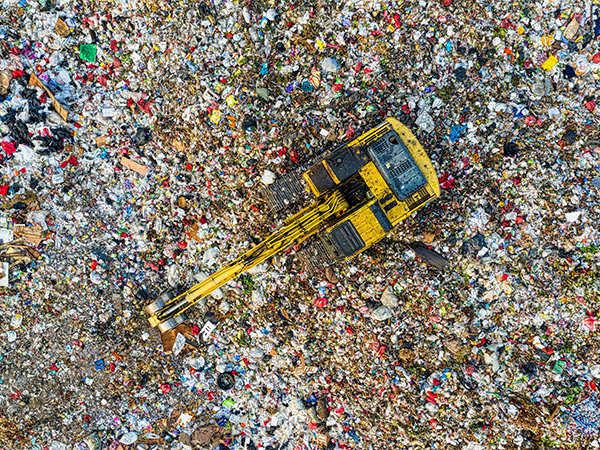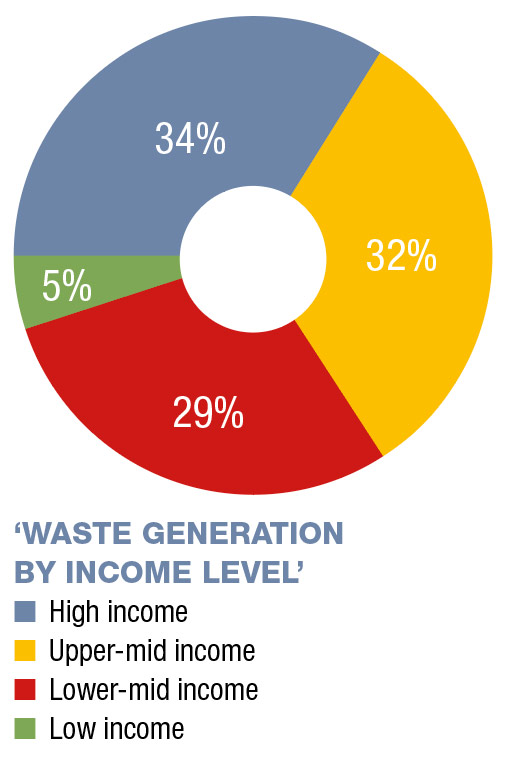
Sustainability: No time to waste
Freelance kitchen designer and self-confessed ‘eco-warrior’, Sandy Armitage, has her say on sustainability and why she feels attitudes must change in order for the KBB industry to reduce its impact on the environment.
Earlier this year I visited London’s Design Museum to catch the last knockings of its ‘Waste Age’ exhibition. The most significant negative impact that we humans have had on this planet has been in the past 50 years and the dirty truth was laid bare through graphic images, 3D exhibits and audio/video.
The exhibition served to remind us that there is no waste in nature – waste is 100% man-made and it showed how galloping consumerism is destroying the planet.
There were two charts, in particular, that really stood out for me. The first (shown on left) very revealing one – called ‘Waste generation by income level’, showed that 34% of waste is generated by those in the high-income bracket; 32% by those in the upper-mid income bracket; 29% by those in the lower-mid bracket and just 5% by those on a low income.
The second chart that really caught my eye was titled: ‘Hierarchy for dealing with waste’ (see below) which shows the best and worst practices for disposing of waste.
I’ve been saying for a very long time that the future is all about vintage – repurposing existing product where possible I also believe we will embrace relevant advanced technologies and use them to underpin our reconnection with nature by producing useful things from green materials with green energies. Because there’s no denying that if it’s made from steel or plastic it’s taken fossil fuels and furnaces to create the materials.
However, we all know, despite those who will deny it, our reliance upon fossil fuels must end.
While I haven’t read it from page to page the message from the IPCC Climate Change 2022: Impacts, Adaptation and Vulnerability report is clear – our impact on the planet is worse than scientists had originally thought.
We have to change, and we have to change right now – no messing about. If this planet is to survive, we must do a 180 degree turn in our behaviour.
How do we do it? We have to consume less but that clashes with the market system that is driven by the continual push for growth, profit and targets. Consuming less means making better, making less and selling less.
For example, appliances must be built to last and must be repairable. The Right to Repair law that came in last July seems to be the first small step in the right direction but so much more has to be done.
I’ve been looking very closely at some of the sustainability claims made by brands in the KBB industry and, on the face of it, many of them look great but, as kbbreview’s Climate Change Champion Richard Hagan revealed in one of his recent articles [kbbreview, February 2022] research shows that as much as 40% of ‘green claims’ made by businesses online could be disingenuous.
As an example, in my humble opinion, saying that your product is ‘Made in Britain’ when the majority of your materials have been sourced from the other side of the globe does not count as sustainable and you certainly cannot claim to have a low carbon footprint.
You can claim that your product has been built to last – but that depends on what it’s made from and it’s only one aspect of the product’s integrity.
I’ve also noticed that ‘sustainable’ and ‘sustainability’ have become such marketing buzzwords that they’ve almost lost their impact. Intentionally or unintentionally, I’ve even noticed them being used with a double entendre by companies desperate to keep their outdated products relevant.
As for fashions and trends, they are two words I have never really liked because they signify the temporary. I’ve spent all my years – of which there are many – in this industry steering my clients away from fads or trends and leading them instead, towards timeless design and well-made products.
We have a fundamental duty to educate ourselves and in turn our clients about the most sustainable goods, materials and services for creating wonderful kitchens and bathrooms and to accept that de-growth is a necessary part. Together, I hope the industry will engage in a wider conversation about how it must change, from the top down.
We designed our way into this situation and now we have to design our way out of it.


